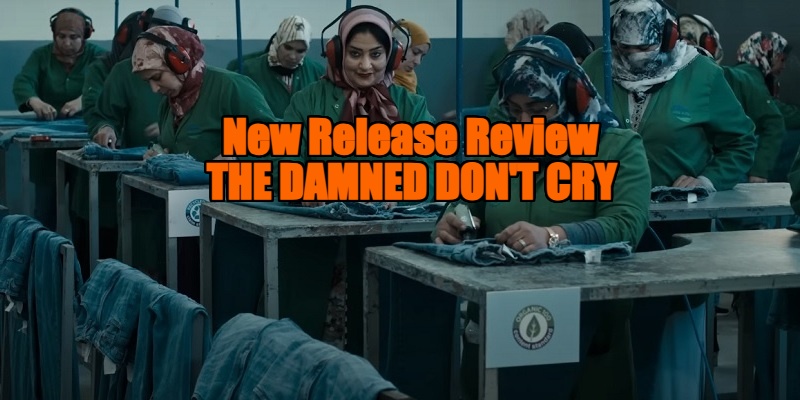
Review by
Benjamin Poole
Directed by: Fyzal Boulifa
Starring: Aicha Tebbae, Abdellah El Hajjouji, Antoine Reinartz

Considering it is meant to be the oldest profession in the world, I've not
met one single person who wanted to be a sex worker when they were growing
up. Not to shame or stigmatise prostitution but I would imagine that most
people sort of fall into it in the same way that one may end up being
homeless or working in an office (another prevailing occupation which I've
yet to hear someone aspire towards, come to think of it), and that for a
certain amount of professionals in the sector it's perhaps something
they'd rather not be doing. Fyzal Boulifa's strangely enervated
The Damned Don't Cry focuses on sex work as a family trade,
with established prostitute Fatima-Zahra (Aicha Tebbae) plying her
craft across Moroccan cities as she outruns scandal and the law, taking
with her Selim (Abdellah El Hajjouji), her late-teenage son who
(inevitably, the film suggests) takes up the game, too.

We open with a deliberately disorientating shot of Fatima-Zahra and Selim
asleep on a rug, both in their underwear as if they were May to December
lovers. It quickly transpires though that they are mother and son, but the
provocation of the initial wide shot lingers as Selim showers in front of
his mother and she routinely washes his hair. Carefully applying eye liner
later, Fatima-Zahra is at pains to look good for what she claims is a job
interview: "First impressions count," she tells her son. Meeting on the
outskirts of the city for paid sex with a regular chancer who takes her to
a secluded spot and proceeds to punch her in the face before stealing her
necklace and purse, Fatima-Zahra finds cold comfort from the police when
she reports the crime. And so, it's off on the lam again with Selim,
mainly to escape paying rent but also just because sometimes flight is its
own relief. The two take with them the still unpacked bags which Selim was
complaining about a few scenes ago. The loop is inescapable.

Following some unsettling revelations at the family homestead concerning
Selim's father, the two duly locate themselves in Tangiers where they hope
to find some sort of stability in perhaps the most notoriously illicit
city on the planet. Will Fatima-Zahra discover love with the lonely
bus-driver who takes them to town? Will Selim's burgeoning relationship
with a pretty local girl lead to something lasting and pure? Fat chance.
Falling in with a criminal element, Selim is given a job via phone, with
the call arriving just as he is about to land an awkward kiss on his
female beau. It's what Swedish pop queen Agnes would call a "sliding door
moment": perhaps if the call had arrived a few moments later,
The Damned Don't Cry's outcomes would be different. But it doesn't and Boulifa reminds us of
how stacked fate is as Selim is guided to an apartment, where he is
instructed to find money, and then wait for a male client who will have
sex with him. The 17-year-old's initial protests are laughed off, as in
this world there are sellers and there are the sold. A buyer, Sébastien
(Antoine Reinartz), who is a white French man, enters, and, in
frustration, Selim violently sodomises him, before dashing out with the
cash.
The dynamics are specifically colonial: Sébastien has a holiday home in
Tangiers, which he visits for sex in the same way that countless rich
white men did before him and which rich white men will continue to do
after him (prob best not to Google the words "Tangiers Sexual Exploitation
2022," unless you want to spend the rest of the afternoon extremely
fucking angry and despondent). Hustling quickly becomes an unwanted but
acceptable form of making money for Selim: turns out the classy Sébastien
enjoyed the rough trade, and he sets the pretty teen up in his house.
Within the strange and tragic correspondence of abuse, dependency and the
false hope of stability grows.

Unlike Boulifa's blistering debut
Lynn + Lucy, The Damned Don't Cry is a more meditative proposition
composed of wide-open photography and lingering sequences. We often
see Selim or Fatima-Zahra framed on balconies or standing near windows
with the looming white city beyond as if to exemplify their trapped
status; so close to metropolitan freedoms but ultimately restrained. For
all their visual scope scenes within the film are airless and extended,
which may well serve to demonstrate the quotidian nature of the characters
fate but can also make The Damned Don't Cry a challenging
watch at times. In the film's final, unrequited moments, we recall the
weird intimacy of the opening, and understand now that taboo sexual energy
was never an aspect of the relationship: Fatima-Zahra and Selim's
proximity was based on mutual reliance and the kind of desperate innocence
that could never really last.

The Damned Don't Cry is in UK/ROI
cinemas and on Curzon Home Cinema from July 7th.

